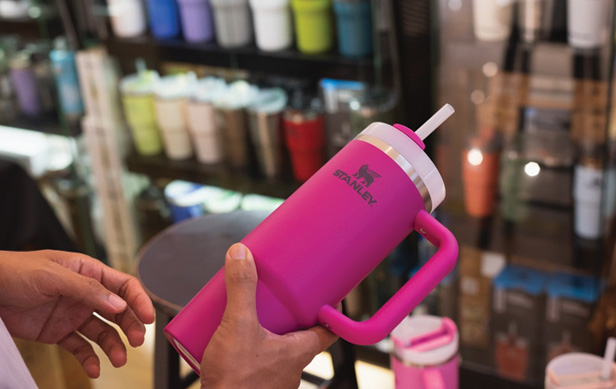News August 02, 2024
Attorneys To Judge: Dismiss Lawsuit Against Stanley Drinkware’s Parent Company
The class action case is asking for hundreds of millions in damages, but lawyers for Pacific Market International say it should be tossed.
Throw it out.
That’s what Pacific Market International (PMI), parent company of the popular Stanley tumbler drinkware brand, wants a federal judge to do with a class action lawsuit consumers brought against it over lead concerns.

On Wednesday July 31, attorneys for PMI filed a motion in federal court in Washington state to dismiss the case, itself a consolidation of several earlier lawsuits, into a single complaint that now seeks hundreds of millions of dollars in damages.
PMI’s reasoning? The complaint alleges no facts that show Stanley drinkware products cause any harm.
“In a lawsuit centered on the alleged failure to disclose a purportedly harmful component of the product, the complaint is striking for its lack of any factual allegations showing that the product causes harm or otherwise poses a ‘safety and health-related concern,’” PMI attorneys wrote in their filing to U.S. District Judge Tana Lin. “That glaring omission cannot be an oversight. … This fatal flaw requires dismissal of the entire complaint.”
In a separate motion, PMI maintained that attorneys for the plaintiffs suing the company over lead concerns goofed, improperly relying on Washington state consumer laws to advance some claims for a nationwide class of consumers. Those allegations should be struck down, PMI said.
An attorney for the plaintiffs, John Rushing of the firm Rushing McCarl, told Reuters that PMI’s reasoning for dismissal doesn’t accurately characterize the plaintiffs’ case. “We have every confidence that we will defeat this motion,” Rushing said.
Lin had not issued a decision on the motion to dismiss as of this writing. The motion asks for oral arguments to be made in court. It’s possible that could occur in September.
Background
After videos started circulating on social media about Stanley lead concerns, PMI said in January that the material it uses to vacuum-insulate tumblers at their base contains some lead.
That prompted plaintiffs to take legal action separately, filing proposed class action lawsuits. Earlier this year, a judge ruled that the lawsuits should be consolidated into a single case, a formal complaint for which attorneys filed on Tuesday, June 18. The court had previously denied PMI’s request to dismiss some of the cases in April.
The suing consumers say they wouldn’t have bought the drinkware if they had known about the lead, accusing PMI of consumer protection law violations, deceptive trade practices and fraud by omission.
Product of the Year? It had to be the Stanley Quencher, didn't it? And it is. Really interesting report on the mega impact of this product on the #promoproducts market by @SaraLav_ASI.
— Chris Ruvo (@ChrisR_ASI) December 21, 2023
2023 Product of the Year: The Stanley Quencher https://t.co/AcS4Yh2vwx
Among other remedies sought, the suit asks that PMI be made to pay punitive damages and to refund what consumers paid for the drinkware. The plaintiffs want that money to go to themselves and others who bought a Stanley tumbler with lead in it.
PMI has previously asserted that the lead in the drinkware’s base isn’t a health threat. Some health experts have said there’s “practically zero risk” of lead exposure from Stanley tumblers, but the U.S. Centers for Disease Control and Prevention has noted that using lead in manufacturing creates “a risk of lead exposure for consumers of those products, especially for products intended for use in food consumption.”
Excessive lead exposure can cause adverse health effects ranging from cardiovascular problems and kidney damage to nervous system issues and slower growth/development in children.
Stanley tumblers have been popular sellers at retail and in the promotional products industry. ASI Media named the Stanley Quencher the 2023 Product of the Year in the branded-merch market. The items continue to generate a high level of searches in ASI’s product research and procurement databases, ESP and ESP+.
